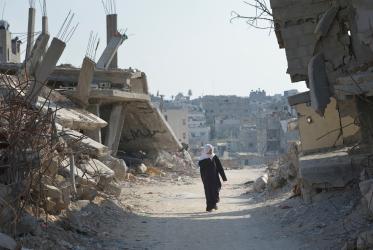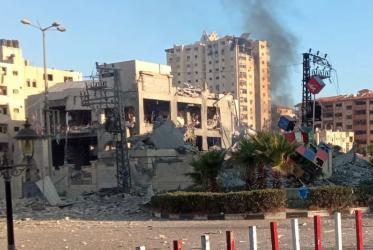The following text explains the background of the Minute on Economic Measures for Peace in Israel/Palestine adopted by the WCC Central Committee in February 2005.
A sign of growing concern
This action reflects growing concern among WCC member churches at the prospects for a just peace in Israel/Palestine. Although the churches hold and welcome hope for peace, substantial and growing threats separate the parties to the conflict.
Focused action
The focus of the "Minute" is specific. It addresses illegal activities on occupied territory.
Clear purpose
The action encourages WCC member churches to examine whether they have economic links to on-going violations of international law. If so, the "Minute" recommends they:
Give serious consideration to adopting corrective economic measures that are equitable, transparent and non-violent.
Take note of various options - mentioning, for example, member churches engaging in selective divestment from companies that profit from the occupation and an earlier call from the WCC to boycott products made in settlements.
Grounded in law
This "Minute" and other expressions of WCC policy consistently promote international law as the essential foundation for a just peace in Israel/Palestine. The "Minute" concerns multinational corporations whose products or services are used in violations of international law.
The violations of law that it mentions - settlements, the Dividing Wall, and house demolitions (most categories of which are on-going) - are key elements of the occupation and major obstacles to peace.
Churches with investment funds in those corporations have an opportunity to use those funds responsibly to censure activity that supports the occupation and to support activities that build peace.
Footnote: WCC Central Committee "Minutes" apply specific, existing WCC policy to specific, new circumstances. Numerous policy statements since 1948 address conflict in the Middle East far beyond the scope of this "Minute" including, for example, WCC affirmations of Israel's legitimate security needs within its internationally recognized borders, condemnations of violence against innocent civilians across those borders, and rejections of all forms of anti-Semitism.
Answers to questions
Q: The WCC Central Committee Minute "targets the whole Israeli economy"? [Questioners' terminology in quotes]
A: No. The Minute's focus is to have churches examine whether they are economically linked to illegal activities in occupied territory. It is about corporations and territory beyond the internationally recognised borders of Israel.
Q: It is "one-sided"? It is "anti-Jewish"?
A: The document is concerned with on-going violations of international law in territory that has been occupied illegally. It is on the side of resolving the conflict by the rule of law and with peaceful means.
Q: "Why not do something similar to the Palestinian side"?
A: One of the church programs specifically mentioned in the WCC resolution responds to this concern. It requires identification of companies that "provide products or services, including financial services, to Israeli or Palestinian organizations or groups that support or facilitate violent acts against innocent civilians" www.pcusa.org/mrti . This approach is very much in keeping with the spirit of the WCC action, which encourages consideration of economic measures for peace.
Q: It "encourages terrorism"?
A: The WCC strongly condemns all forms of violence by armed Palestinian groups against innocent civilians inside the State of Israel and by Israeli forces inside the Occupied Palestinian Territories.
The current document calls for "equitable, transparent and non-violent" economic measures.
Q: Why now? Why the "bad timing"?
A: There is growing commitment to peace in Israel and Palestine among various member churches of the WCC. Now that concern has come from parishes at the grassroots to the WCC Central Committee.
This WCC vote welcomes the new atmosphere of hope but awaits a reduction in the threats that separate the two sides. Votes for peaceful measures against those threats are timely as long as the threats persist.
Q: What is meant by "economic measures"?
A: Economic measures here means churches and individuals taking economic decisions conscious of the impact of their actions. This can take various forms. People know the occupation must end in order for peace to come, so they first study what companies are involved in the occupation and how. Then they might choose to open discussion with those companies, mount shareholder resolutions, sell their shares, or not buy from the company in question. Other actions are to screen companies according to faith-based criteria for responsibility and to support companies that invest, for example, in needy communities. Another example in this instance is to identify settlement products or not to buy anything made in a settlement. The WCC action recommends that concerned churches consider responsible uses of any of these options.
Q: "Where are the WCC's investments?"
As per the WCC governing body's recommendation, the investments are being reviewed.
Q: Why not criticize other occupations of territory?
WCC responds to various violations of international law including occupations of territory. Responses reflect a number of factors: the terms of international law, concerns brought forward by member churches, consensus within the Council, and the type of response judged to be most appropriate.
Q: Why did you quote that verse of the Bible?
The words in Luke 19 are one of many that reflect the deep commitment to peace in the Gospels. We believe such passages speak truth to power then and now.




